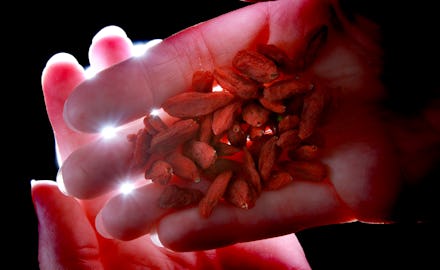What Are Superfruits? The Truth About Health Benefits of Antioxidant-Rich Fruits

Superfruits aren't literally heroic fruits that wear capes and save the city from evil villains on a daily basis — they may not even be metaphorical superheroes. A superfruit is essentially any fruit with a lot of antioxidants, but more than 200,000 studies have been conducted on the health benefits of antioxidants since the 1940s and yet it's still unclear exactly how the antioxidants, which earned a group of expensive fruits the "super" label, benefits our health.
The word "superfruit" is mainly a marketing term — it doesn't have an official definition under any government food authorities. Antioxidants, superfruits' allegedly miracle ingredient, are vitamins like C and E that are supposed to rid our bodies of potentially harmful oxidized agents. The noble fruit category includes an abundance of berries like goji berries, acai berries, maqui berries, yumberries, chokeberries, lychee berries (you get the point) and other fruits like baobabs, mangosteens, sea buckthorn, jujube fruit, cupuacus, pitayas and pomegranates.
Read more:
Manufacturers advertise antioxidants as a miracle substance that has the potential to prevent and relieve illnesses like cancer and heart disease, but scientific research has yet to prove that, according to researchers at Tufts University. Conflicting long-term studies on vitamin E have concluded both that antioxidants can reduce the risk of heart disease by up to 40% and that it has no benefit in preventing or reducing the disease.
It could be the studies that are flawed, not the antioxidants, according to Jeffrey B. Blumberg, a professor at Tufts' Friedman School of Nutrition Science and Policy. "We now know that [vitamin E] probably worked for some people and didn't for others," he told Tufts Journal. "In a new age of personalized nutrition, we have capability to see how antioxidants affect individuals."
While Blumberg argued that antioxidants are beneficial to our health, he recognized that the word "superfruit" has become a glamorized, empty word that manufacturers slap on expensive, exotic fruits to attract consumers.
Superfruit "implies some fruits and vegetables are clearly much better than others," he said. "The science doesn't support that. What [we all] need to do is eat more fruit, period."
"'Superfruit' is just a marketing term," Gregory Cole, professor of medicine and neurology at UCLA told the Los Angeles Times. Tufts human nutrition researcher Barbara Hale prefers to call them "high polyphenolic fruits" — not exactly marketing friendly.
Bottom line: Superfruits are good for you — but maybe not enough to have their own supreme, or supremely expensive, fruit category. It's hard to say when such little research has been done on comparing health benefits of more common fruits.
"Small trials may show that the upper-class fruits are better than placebos," Cole told the Times. "But are they better than the common fruits?" Hale agreed. "Who knows?" she said. "Maybe the peach is the best thing out there. We don't know, because we haven't studied the peach."